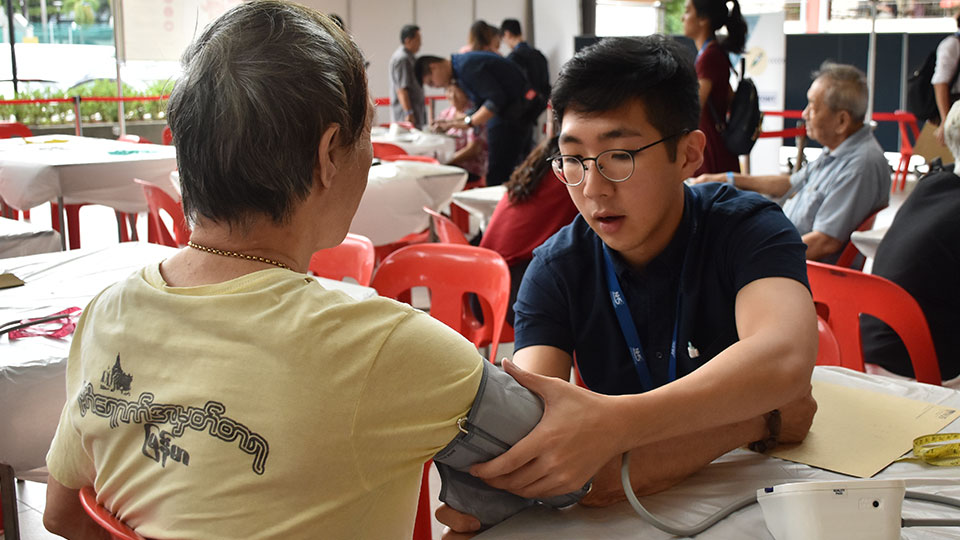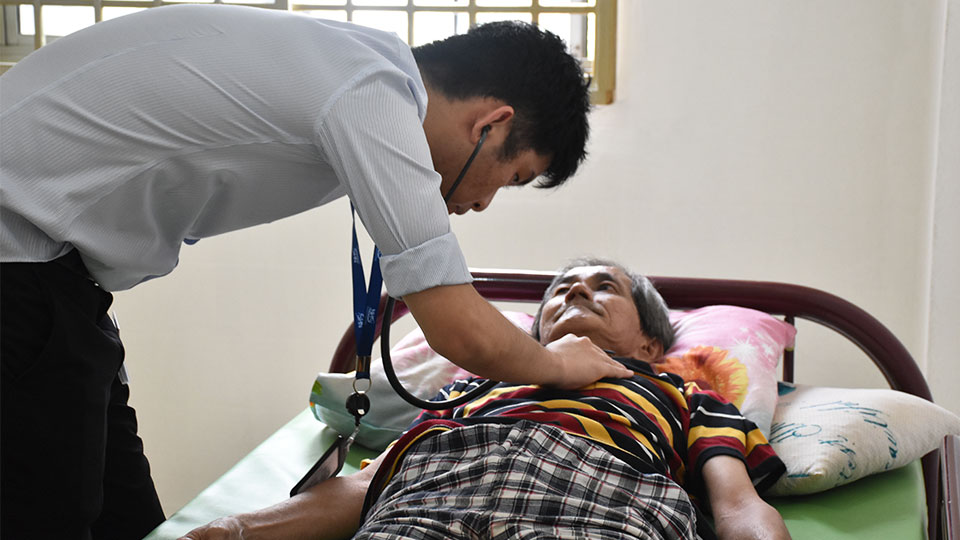Neighbourhood Health Service screens for all chronic illnesses
Published: 11 Sep 2018

Student-led initiative morphs into a truly comprehensive health screening programme
Singapore’s pioneering student-led health screening programme for residents of rental HDB apartments is going big this year, the 12th since the programme began in 2007.
This year, the National University of Singapore (NUS) medical student planners of the Neighbourhood Health Service intend to screen residents in Kampong Glam and Queenstown (Leng Kee) for all chronic illnesses as well as oral, vision and hearing health. The first screening was held on 7 and 8 September 2018 at Kampong Glam Community Club. Students and volunteers reached out to over 2400 residents in the district and screened more than 500 residents, the highest recorded number from one screening. They will also follow up on residents in districts screened in previous years, including those residing in Eunos Crescent and Kampong Glam.
The students conduct this comprehensive exercise with the support and partnership of the respective Regional Health Systems, the Health Promotion Board (HPB) and the Agency for Integrated Care (AIC). Bringing the key players involved in healthcare delivery in Singapore on board NHS 2018 means the event this year is a truly holistic, community-based health screening that is aligned with nationwide screening efforts. It is also the first of its kind in the country, said Associate Professor Gerald Koh of the Saw Swee Hock School of Public Health. He and a team of doctors from the National University Health System (NUHS), SingHealth and National Healthcare Group (NHG) are advising and guiding the NHS’ student planners. This flagship community service project by the students of the NUS Yong Loo Lin School of Medicine is the only student-led School project that has nationwide reach and scale, involving all three Regional Health Systems (NUHS, SingHealth, NHG) to serve over 5,000 residents in nine different districts, from Taman Jurong to Eunos Crescent over the years.
This year’s screenings bring together five unique screening programmes – SingHealth and the NHG’s chronic disease screenings, the National Dental Centre Singapore and Singapore Eye Research Institute’s oral health and vision screenings, the SingHealth community falls prevention programme and Singapore Cancer Society’s cancer screenings.
Residents will be assessed via multi-level tests in five distinct categories through a “one-stop shop” screening covering:
- Chronic diseases (diabetes mellitus, hyperlipidaemia, hypertension, obesity)
- Functional modalities (vision, oral health, hearing)
- Fall prevention
- Cancer (colorectal, cervical, breast)
- Mental health (dementia, depression)
“The students had decided to expand this year’s screening efforts to cover a wider range of clinical conditions as they found that residents living in HDB rental blocks are four times less likely than the average Singaporean to go for regular health check-ups,” said Assoc Prof Koh. Additionally, the students found that only 11 per cent of rental block residents preferred to approach Western-trained doctors, while 30 per cent preferred alternative medicine. Another 53 per cent indicated a preference for “self-reliance”.
The findings spurred the NHS 2017 planners to expand their follow-up programme. And so, close to 300 residents with abnormal results for chronic disease screenings (i.e. 30 per cent of residents who were screened) were selected for follow-up last year. The aim was not to replace primary care physicians or to prescribe medicines, but to motivate these residents to follow-up with their family doctors on their screening results.
Trained by the NUHS Department of Family Medicine in motivational interview techniques frequently used to counsel patients, NHS student committee members engaged residents in conversation via phone calls and house visits in more complex cases. This was done at regular three-monthly intervals, for up to a year after the residents’ screening. At these sessions, the residents were encouraged to adopt positive health-seeking behaviour.
As of June 2018, 64 per cent of 284 residents, mostly living in rental blocks, were discharged from follow-up, meaning that they had been seeing their doctors for a sustained period of time and taking their medicines regularly. Another nine per cent remain on follow-up, while five per cent withdrew consent for follow-up. “This is a commendable achievement, considering that lower-income rental block residents are less likely than the average Singaporean to seek healthcare support due to their difficult socioeconomic circumstances,” Assoc Prof Koh added.
NHS is also working with its partners to get in touch with about 60 residents (21 per cent) who were uncontactable by phone after the screenings in 2017.
Door-to-door screening is also cost-effective
In addition to door-to-door publicity, screening and follow-up, NHS organisers also partnered the Tzu Chi Foundation to provide blood tests for immobilised residents in the comfort of their homes.
To establish the cost-effectiveness of such an approach, the NHS organisers worked with a team of NUS Business students, mentored by Associate Professor Albert Teo (Director, Chua Thian Poh Community Leadership Centre).
The team conducted a social return on investment (SROI) analysis in 2015 and found that for every $1.00 invested in NHS over a five-year cycle, $2.29 in social returns were generated yearly on average. The study showed the cost-effectiveness of the door-to-door concept. Today, door-to-door healthcare is slowly being implemented across the island.
While NHS remains an initiative led by NUS Medicine students, it now welcomes students from all other medical schools in Singapore – the Lee Kong Chian School of Medicine and Duke-NUS Medical School – as well as social work, nursing, physiotherapy and occupational therapy students from NUS Social Work, NUS Nursing, Nanyang Polytechnic and the Singapore Institute of Technology.
The next NHS screening will take place in Queenstown (Leng Kee Community Club) on 6 and 7 October 2018.
See press release.
News Coverage
- The Straits Times online, 7 September 2018
- Channel NewsAsia, 6 September 2018
- Channel 5 News, 6 September 2018
- Channel 8 News, 6 September 2018
- Channel U News, 6 September 2018
- Capital 95.8FM, 6 September 2018
- The New Paper, 7 September 2018, p24
- Berita Harian, 12 September 2018, p16




